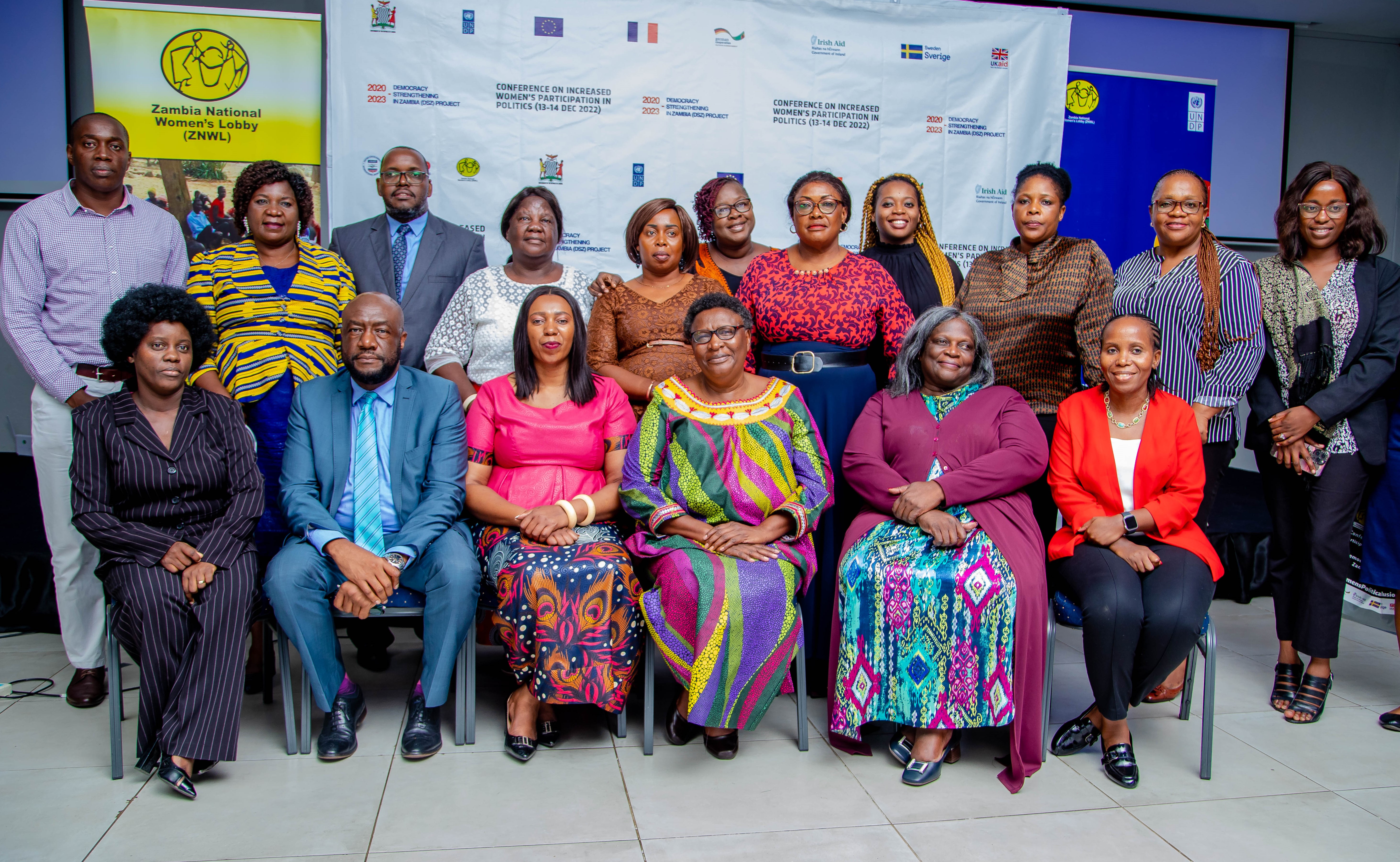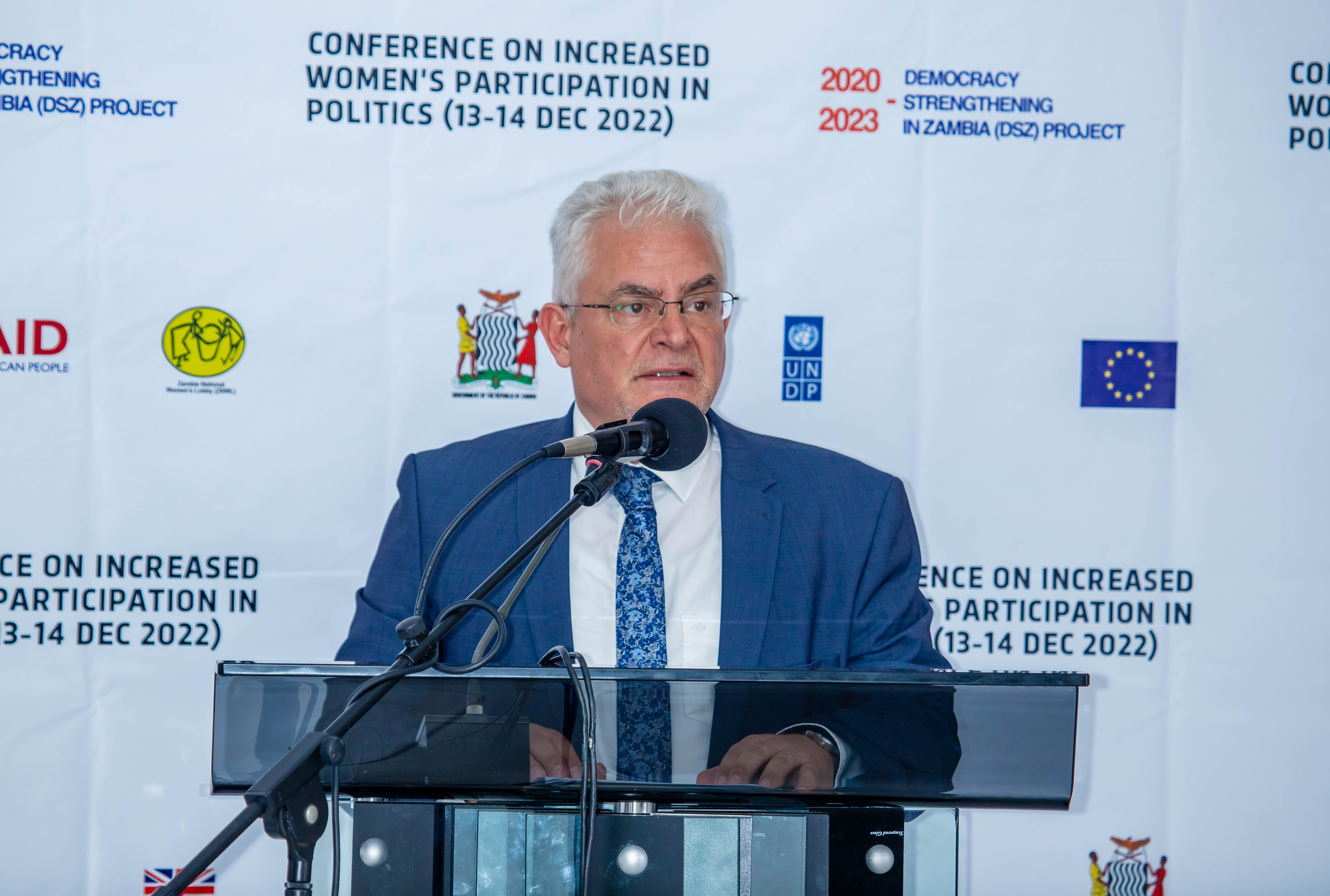The Democracy Strengthening Project in Zambia along with the Zambia National Women's Lobby hosted the Inaugural Conference on Policies and Strategies for Increased Participation and Representation of Women in Elections and Politics in Zambia in Kabwe
Working Towards Increased Women's Political Participation in Zambia
December 19, 2022

The Permanent Secretary to the Gender Division in the Office of the President, Mainga D. Kabika (Seated to the middle left in pink), the Senior Elections Advisor, Takawira Musavengana (Seated second from the left in a grey suit), and the Executive Director of Zambia National Women's Lobby, Juliet Chibuta (seated to the far left), with the attendees at the Conference on Policies and Strategies for Increased Participation and Representations of Women in Elections and Politics in Zambia
In line with our commitment to further discussions around gender-based violence (GBV) and gender-related issues past the boundaries of #16Days, our Democracy Strengthening in Zambia project partnered with the Zambia National Women’s Lobby (ZNWL) in organising a two-day conference to discuss ways of improving women’s participation in politics in Zambia. The Conference on Policies and Strategies for Increased Participation and Representations of Women in Elections and Politics in Zambia featured keynote addresses from the Permanent Secretary to the Gender Division in the Office of the President – Mainga D. Kabika, the UNDP Zambia Resident Representative – Lionel Laurens, and the Chairperson of the ZNWL – Daisy Ng’ambi.
Zambia currently boasts a majority female population at over 51%, however women currently represent 20.5% of political positions in the country. Governments with a largely visible women’s representation in governance are key positioning women’s issues as key political focus areas in development.As such, it has become increasingly critical to advocate for the increased participation of women in elections and in politics. On the current position of women in governance and the push towards the inclusion of women in governance, the Permanent Secretary of the Gender Division of the Office of the President, Mainga D. Kabika, stated:
“Women continue to be side-lined from making critical decisions that affect their lives. This is not only a shortfall in the requirements for a democratic country, but also an impediment to the attainment of social and economic development as women represent over 50 percent of the country’s human resource. Further, failure by women to participate in elections reduces the legitimacy of the electoral processes. This is truer for a country like Zambia where the majority of the population is female.
I must however state that the enactment of the Gender Equality and Equity Act of 2015 and the other regional and international conventions which Zambia has assented, have been beneficial in facilitating women’s inclusion in governance processes.”
With the support of the European Union, the Governments of France, Sweden, Ireland, Germany, the United Kingdom and the United States of America, the participants explored possible implementable solutions that can lead to the strategic inclusion of women from various backgrounds onto decision-making tables across Zambia’s political space.The discussions also focused on the principle of Leaving No One Behind in efforts to increase the participation of women. Several participants and speakers such as Gender Expert Dr. Nalukui Milapo, referred to the importance of amplifying the political voices of rural women and women with disabilities, to ensure that in Zambia’s progress to more gender inclusive governance systems, women of all backgrounds are represented and welcomed to participate.

Resident Representative, Lionel Laurens at the Conference on Policies and Strategies for Increased Participation and Representations of Women in Elections and Politics in Zambia
“The challenges for women’s inclusion in elected leadership in Zambia affect women from various backgrounds differently. In this regard, I would like to extend a special welcome to the young women and rural women who have been invited to this conference. We must also consider how women with disabilities interface with and are affected by political processes in the country. In short, we must attempt to respond to the axiom: nothing about us, without us!”— Lionel Laurens, UNDP Zambia Resident Representative
At the close of the conference, the participants challenged the current policies in place and proposed possible actions to the Gender Division of the Office of the President, the UNDP, and all stakeholders present, through a presentation of the conference resolutions that explored the current context of Zambia and an assessment of comparative experiences from other countries in the region.

 Locations
Locations




